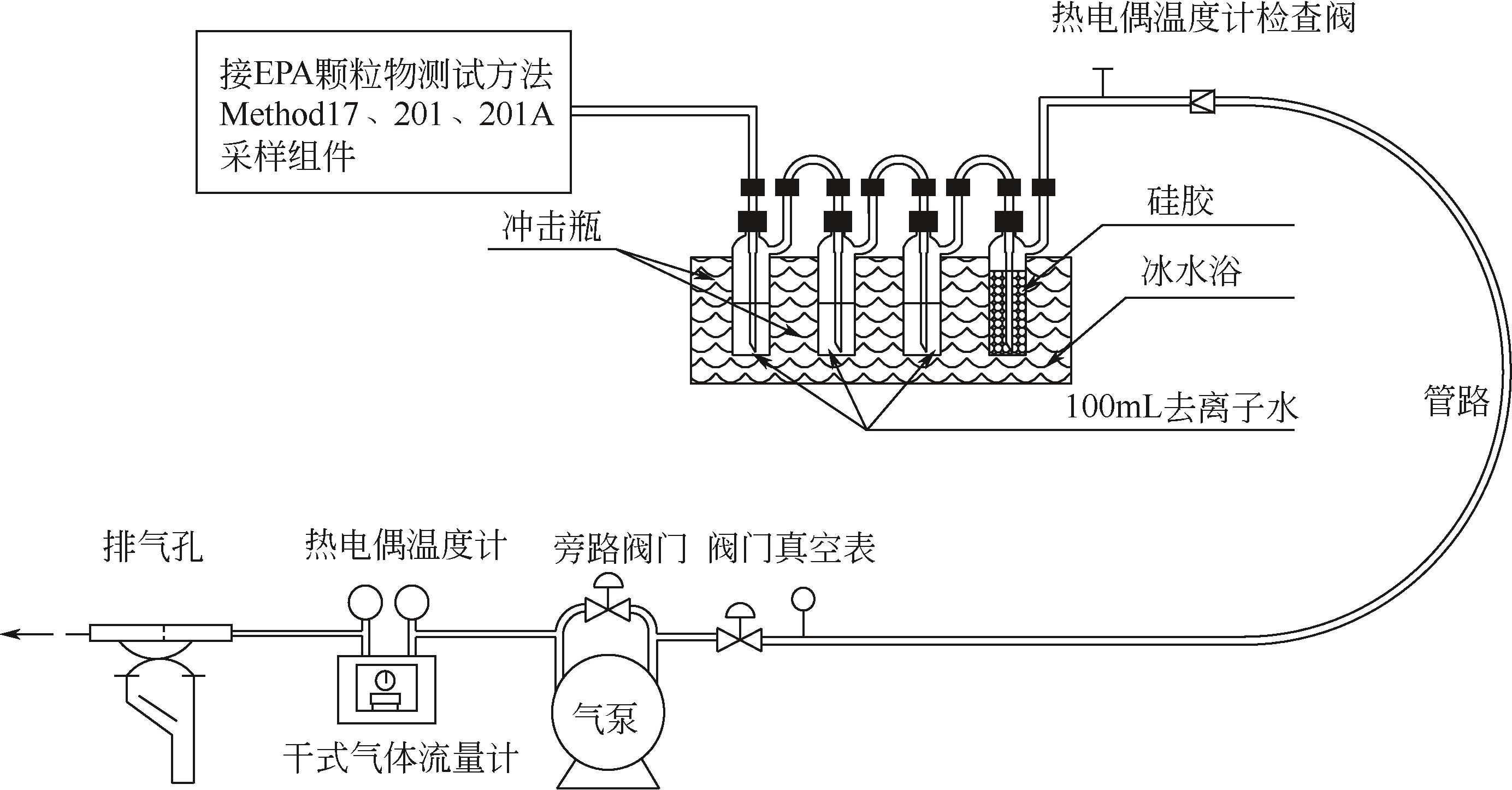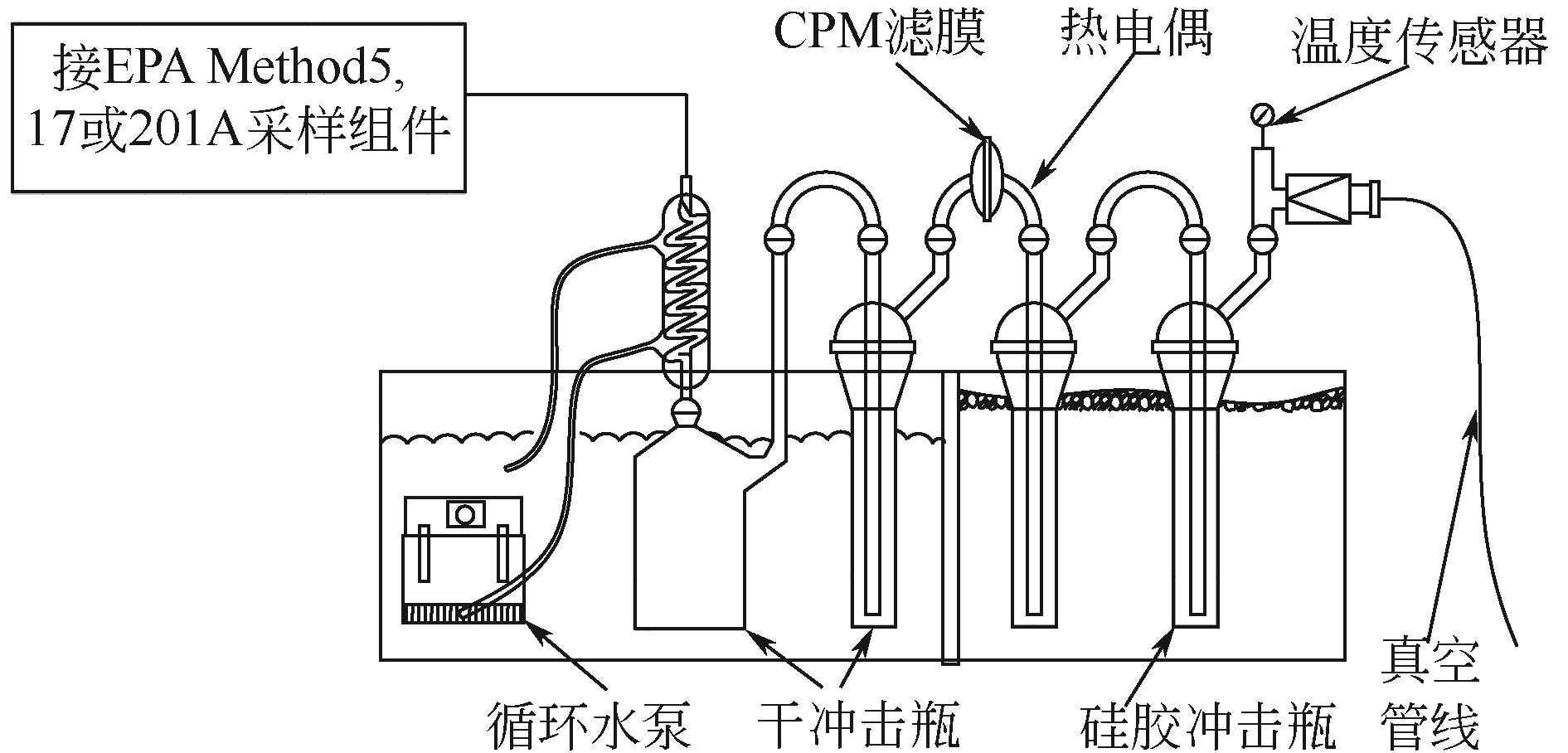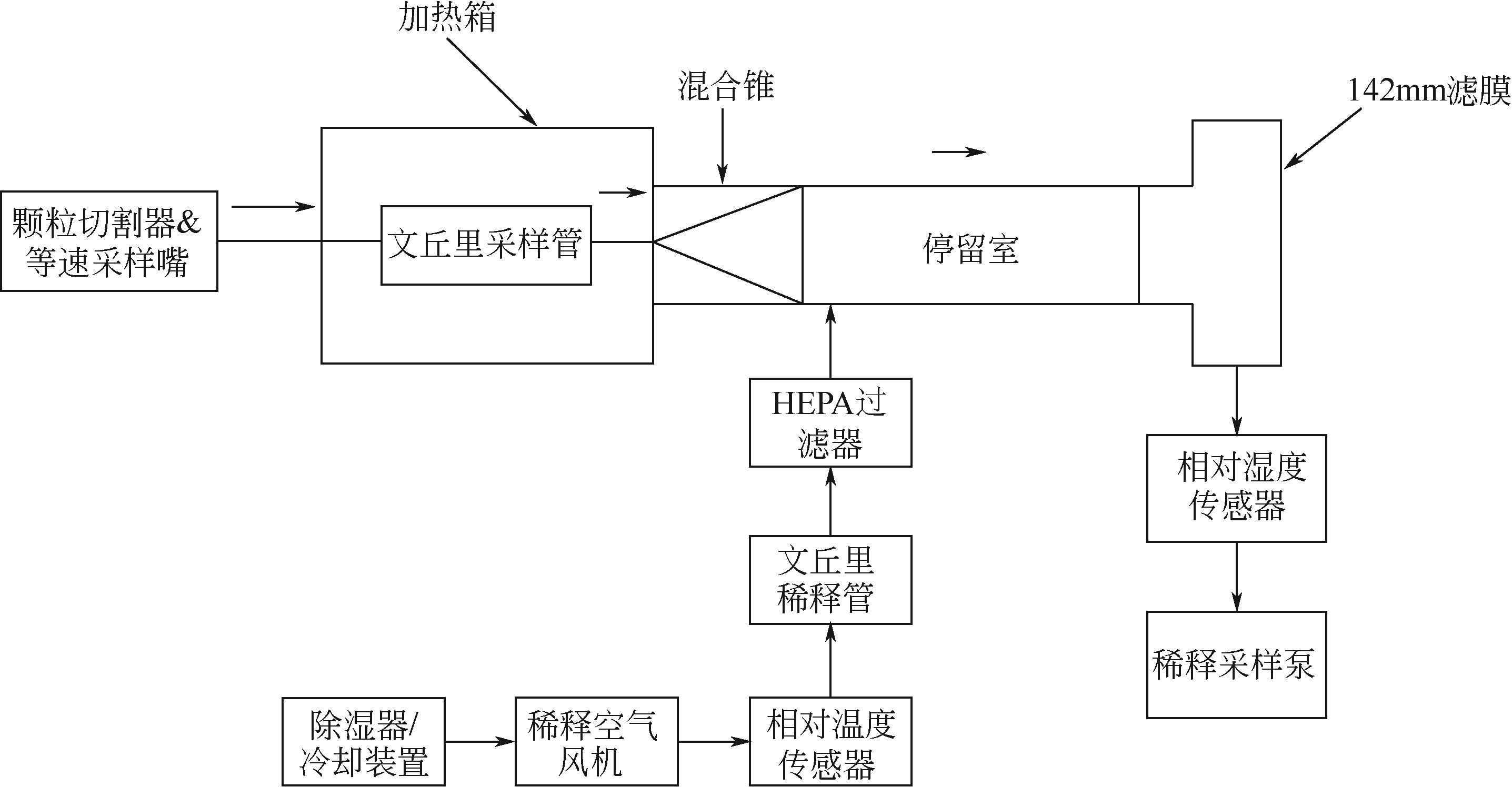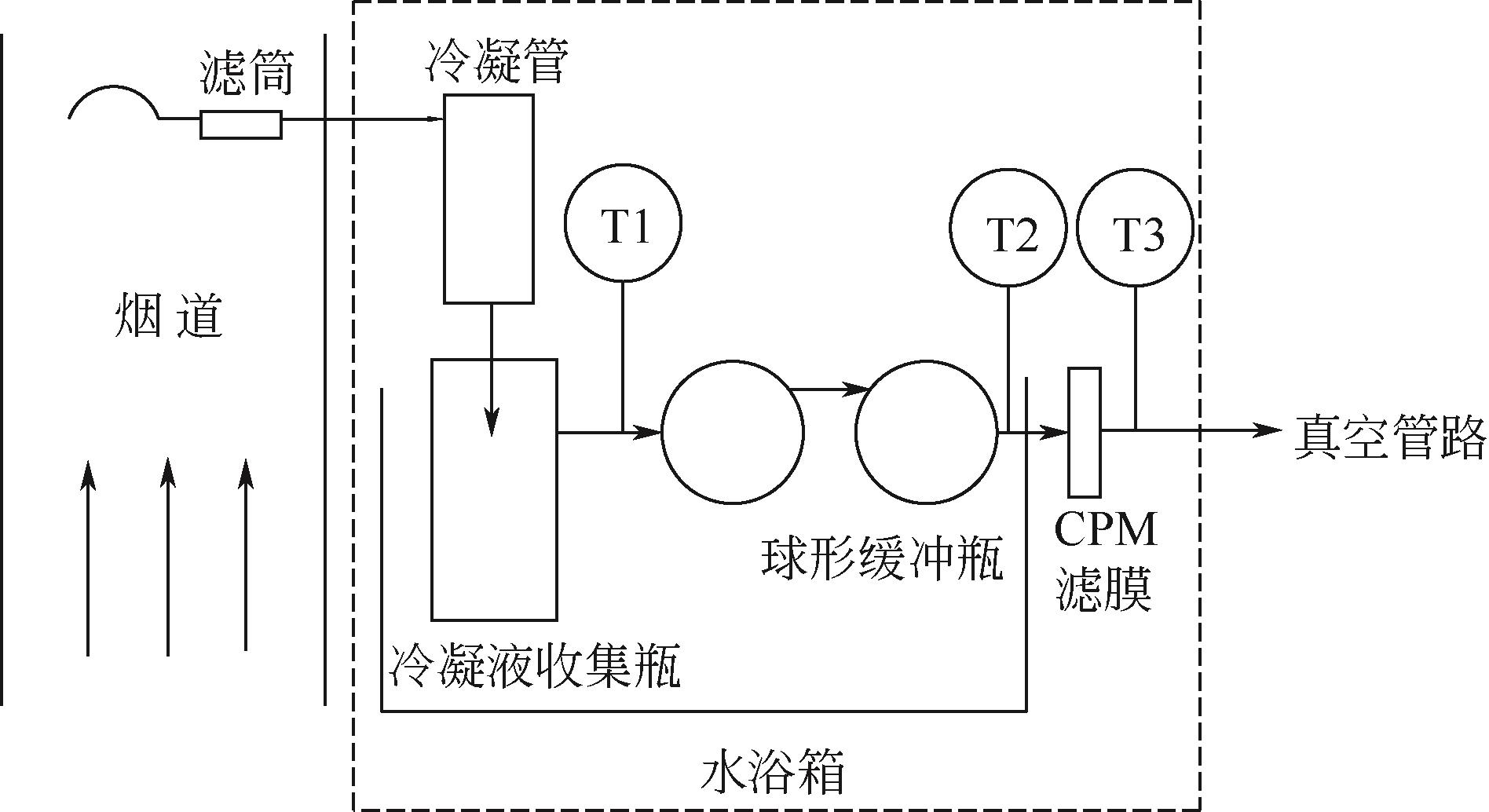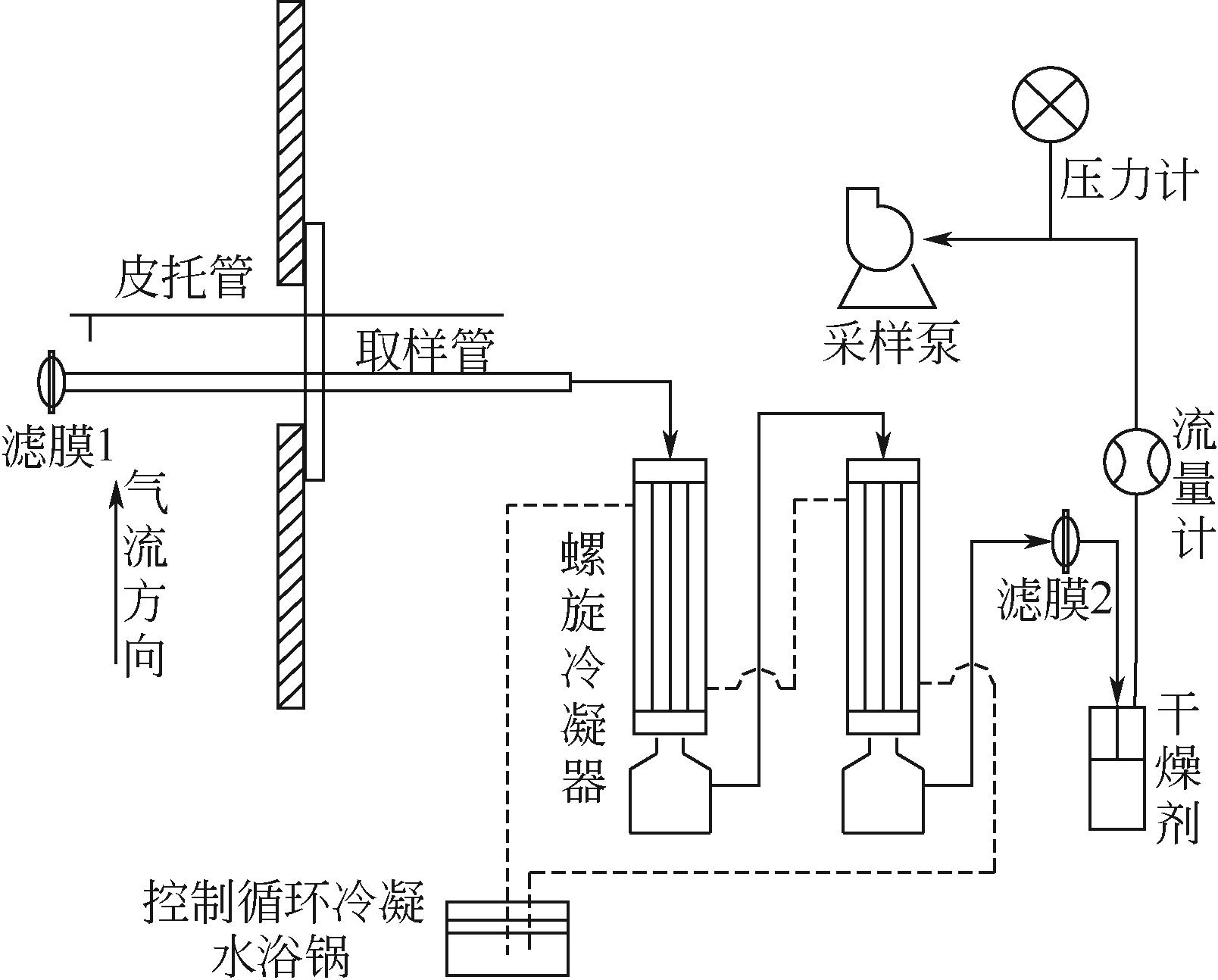化工进展 ›› 2021, Vol. 40 ›› Issue (8): 4515-4524.DOI: 10.16085/j.issn.1000-6613.2020-1797
燃煤电厂可凝结颗粒物检测方法、排放特征及脱除技术研究进展
于洋1( ), 周欣1, 程俊峰1(
), 周欣1, 程俊峰1( ), 董长青2, 王玉山1, 刘英华1
), 董长青2, 王玉山1, 刘英华1
- 1.北京清新环境技术股份有限公司,北京 100036
2.华北电力大学新能源学院,北京 102206
-
收稿日期:2020-09-07出版日期:2021-08-05发布日期:2021-08-12 -
通讯作者:程俊峰 -
作者简介:于洋(1984—),男,博士,研究方向为固定燃烧源烟气中细颗粒物检测与控制技术。E-mail:yuyangbuct@126.com 。 -
基金资助:国家自然科学基金(51776070)
Research progress in detection methods, emission natures and removal technologies of condensable particulate matter from coal-fired power plants
YU Yang1( ), ZHOU Xin1, CHENG Junfeng1(
), ZHOU Xin1, CHENG Junfeng1( ), DONG Changqing2, WANG Yushan1, LIU Yinghua1
), DONG Changqing2, WANG Yushan1, LIU Yinghua1
- 1.Beijing SPC Environment Protection Tech Co. , Ltd. , Beijing 100036, China
2.School of New Energy, North China Electric Power University, Beijing 102206, China
-
Received:2020-09-07Online:2021-08-05Published:2021-08-12 -
Contact:CHENG Junfeng
摘要:
燃煤电厂排放的颗粒物分可过滤颗粒物(filterable particulate matter,FPM)和可凝结颗粒物(condensable particulate matter,CPM)。过去,人们对CPM的关注较少,但其对环境与人体具有危害。本文综述了CPM的检测方法,主要有撞击冷凝法和稀释冷凝法,开发在线及小型便携设备是CPM检测技术的发展方向。分析了燃煤电厂CPM的排放特征,CPM占燃煤电厂排放总颗粒物的比重较高,经超低排放改造后,CPM占比进一步提升,各燃煤电厂排放的CPM的组分差异较大。根据CPM的特性,未来对CPM控制技术的研究方向为冷凝、吸附、湿式电除尘等。最后基于当前CPM的研究现状,建议国家相关部门制定对燃煤电厂等固定污染源排放的CPM的检测标准并对实施超低排放改造的燃煤电厂建立源排放清单,对新建、处于环境敏感地带以及排烟带有明显“有色烟羽”现象的燃煤电厂,合理管控其CPM的排放。
中图分类号:
引用本文
于洋, 周欣, 程俊峰, 董长青, 王玉山, 刘英华. 燃煤电厂可凝结颗粒物检测方法、排放特征及脱除技术研究进展[J]. 化工进展, 2021, 40(8): 4515-4524.
YU Yang, ZHOU Xin, CHENG Junfeng, DONG Changqing, WANG Yushan, LIU Yinghua. Research progress in detection methods, emission natures and removal technologies of condensable particulate matter from coal-fired power plants[J]. Chemical Industry and Engineering Progress, 2021, 40(8): 4515-4524.
| 1 | 李博, 王卫良, 姚宣, 等. 煤电减排对中国大气污染物排放控制的影响研究[J]. 中国电力, 2019, 52(1): 110-117. |
| LI Bo, WANG Weiliang, YAO Xuan, et al. Study on the effects of emission reduction in coal-fired power industry on China’s air pollutant emission control[J]. Electric Power, 2019, 52(1): 110-117. | |
| 2 | 王丽娟, 栾丽杰. 钙基干粉喷射联合袋式除尘器脱Hg/SO3的性能分析[J]. 环境工程学报, 2020, 14(3): 743-753. |
| WANG Lijuan, LUAN Lijie. Performance analysis of calcium base dry powders jet combined with bag filter on Hg/SO3 removal[J]. Chinese Journal of Environmental Engineering, 2020, 14(3): 743-753. | |
| 3 | 徐静馨, 朱法华, 王圣, 等. 超低排放燃煤电厂和燃气电厂综合对比[J]. 中国电力, 2020, 53(2): 164-172, 179. |
| XU Jingxin, ZHU Fahua, WANG Sheng, et al. Comprehensive comparison of ultra-low emission coal-fired power plants and gas-fired power plants[J]. Electric Power, 2020, 53(2): 164-172, 179. | |
| 4 | 李干杰. 坚决打赢污染防治攻坚战 以生态环境保护优异成绩决胜全面建成小康社会[J]. 环境保护, 2020, 48(1/2): 8-16. |
| LI Ganjie. Resolutely win the fight against pollution, secure a decisive victory in building a moderately prosperous society in all respects with outstanding achievement in ecological environment protection[J]. Environmental Protection, 2020, 48(1/2): 8-16. | |
| 5 | WU Bobo, TIAN Hezhong, HAO Yan, et al. Effects of wet flue gas desulfurization and wet electrostatic precipitators on emission characteristics of particulate matter and its ionic compositions from four 300 MW level ultralow coal-fired power plants[J]. Environmental Science & Technology, 2018, 52(23): 14015-14026. |
| 6 | 杨晓媛, 肖立春, 张萌, 等. 化学团聚对燃煤细颗粒物的脱除[J]. 环境工程, 2018, 36(11): 58-63. |
| YANG Xiaoyuan, XIAO Lichun, ZHANG Meng, et al. Removal of fine particles from coal combustion by chemical agglomeration[J]. Environmental Engineering, 2018, 36(11): 58-63. | |
| 7 | 王彦超, 蒋春来, 贺晋瑜, 等. 京津冀大气污染传输通道城市燃煤大气污染减排潜力[J]. 中国环境科学, 2018, 38(7): 2401-2405. |
| WANG Yanchao, JIANG Chunlai, HE Jinyu, et al. Air pollutant emissions reduction potential from burning coal in cities of air pollution transmission channel in Beijing-Tianjin-Hebei area[J]. China Environmental Science, 2018, 38(7): 2401-2405. | |
| 8 | WANG Gang, DENG Jianguo, MA Zizhen, et al. Characteristics of filterable and condensable particulate matter emitted from two waste incineration power plants in China[J]. Science of the Total Environment, 2018, 639: 695-704. |
| 9 | CANO M, VEGA F, NAVARRETE B, et al. Characterization of emissions of condensable particulate matter in clinker kilns using a dilution sampling system[J]. Energy & Fuels, 2017, 31(8): 7831-7838. |
| 10 | YANG Hsi-Hsien, ARAFATH S MD, LEE Kuei-Ting, et al. Chemical characteristics of filterable and condensable PM2.5 emissions from industrial boilers with five different fuels[J]. Fuel, 2018, 232: 415-422. |
| 11 | 张德君, 刘含笑, 赵琳, 等. 燃煤电厂可凝结颗粒物(SO3)采样方法研究[J]. 中国电力, 2018, 51(6): 33-36, 149. |
| ZHANG Dejun, LIU Hanxiao, ZHAO Lin, et al. Study on the method of sampling of coagulated particulate matter (SO3) in coal-fired power plants[J]. Electric Power, 2018, 51(6): 33-36, 149. | |
| 12 | 柴小康, 黄国和, 解玉磊, 等. 某燃煤超低排放机组非常规污染物脱除[J]. 环境工程学报, 2020, 14(12): 3480-3494. |
| CHAI Xiaokang, HUANG Guohe, XIE Yulei, et al. Unconventional pollutant removal of a coal-fired ultra-low emission unit[J]. Chinese Journal of Environmental Engineering, 2020, 14(12): 3480-3494. | |
| 13 | LI Xiaodong, ZHOU Chenyang, LI Jingwei, et al. Distribution and emission characteristics of filterable and condensable particulate matter before and after a low-low temperature electrostatic precipitator[J]. Environmental Science and Pollution Research, 2019, 26(13): 12798-12806. |
| 14 | U. S. Environmental Protection Agency. Determination of condensable particulate matters from stationary source: EPA Method 202[S]. North Carolina, US: Air Emission Measurement Center, 1991. |
| 15 | WANG Gang, DENG Jianguo, ZHANG Ying, et al. Evaluating airborne condensable particulate matter measurement methods in typical stationary sources in China[J]. Environmental Science & Technology, 2020, 54(3): 1363-1371. |
| 16 | 高境, 赵传峰, 刘宇, 等. 有色烟羽分析及可凝结颗粒物管控技术综述[J]. 环境影响评价, 2019, 41(3): 6-10. |
| GAO Jing, ZHAO Chuanfeng, LIU Yu, et al. Analysis of colored smoke plumes and introduction of a condensable particulate matter control technology[J]. Environmental Impact Assessment, 2019, 41(3): 6-10. | |
| 17 | 江得厚, 苏跃进. 治霾当务之急是控制可凝结颗粒物的排放浓度[J]. 电力科技与环保, 2018, 34(4): 1-6. |
| JIANG Dehou, SU Yuejin. The haze pollution controlling requires emission concentration reducing of condensable particulates first[J]. Electric Power Technology and Environmental Protection, 2018, 34(4): 1-6. | |
| 18 | 裴冰. 固定源排气中可凝结颗粒物排放与测试探讨[J]. 中国环境检测, 2010, 26(6): 9-12. |
| PEI Bing. Discussion on the emission issues and testing of condensable particulate matter from exhaust gas of stationary source[J]. Environmental Monitoring in China, 2010, 26(6): 9-12. | |
| 19 | 朱法华, 孙尊强, 申智勇. 超低排放燃煤电厂有色烟羽成因及治理技术的经济与环境效益研究[J]. 中国电力, 2019, 52(8): 1-7, 25. |
| ZHU Fahua, SUN Zunqiang, SHEN Zhiyong. Cause analysis of colored smoke plume and related studies on economic and environmental benefits of its treatment technologies for ultra-low emission coal-fired power plants[J]. Electric Power, 2019, 52(8): 1-7, 25. | |
| 20 | 刘含笑, 陈招妹, 王少权, 等. 燃煤电厂SO3排放特征及其脱除技术[J]. 环境工程学报, 2019, 13(5): 1128-1138. |
| LIU Hanxiao, CHEN Zhaomei, WANG Shaoquan, et al. Emission characteristics and removal technology of SO3 from coal-fired power plants[J]. Chinese Journal of Environmental Engineering, 2019, 13(5): 1128-1138. | |
| 21 | 张斌, 杨柳, 李军状, 等. 燃煤锅炉烟气可凝结颗粒物研究进展[J]. 环境科学与技术, 2019, 42(2): 99-103. |
| ZHANG Bin, YANG Liu, LI Junzhuang, et al. Research progress on condensable particulate matter emitted from coal-fired boiler[J]. Environmental Science & Technology, 2019, 42(2): 99-103. | |
| 22 | RICHARDS J, HOLDER T, GOSHAW D. Optimized Method 202 sampling train to minimize the biases associated with Method 202 measurement of condensable particulate matter emissions[C]// Hazardous Waste Combustion Specialty Conference. Missouri: Air & Waste Management Association, 2005. |
| 23 | TSUKADA M, HORIKAWA A, SUGIMOTO K, et al. Emission behavior of condensable suspended particulate matter from a laboratory scale RDF fluidized bed combustor[J]. Journal of Chemical Engineering of Japan, 2007, 40(10): 869-873. |
| 24 | U. S. Environmental Protection Agency. Dry impinger method for determining condensable particulate emissions from stationary sources: OTM-28[S]. North Carolina, US: Air Emission Measurement Center, 2010. |
| 25 | U. S. Environmental Protection Agency. Measurement of PM2.5and PM10emissions by dilution sampling (constant sampling rate procedures): CTM-039[S]. North Carolina, US: Air Emission Measurement Center, 2004. |
| 26 | CANO M, VEGA F, PALOMO D, et al. Characterization of condensable particulate matter emissions in agricultural diesel engines using a dilution-based sampling train[J]. Energy & Fuels, 2019, 33(2): 779-787. |
| 27 | 裴冰. 燃煤电厂可凝结颗粒物的测试与排放[J]. 环境科学, 2015, 36(5): 1544-1549. |
| PEI Bing. Determination and emission of condensable particulate matter from coal-fired power plants[J]. Environmental Science, 2015, 36(5): 1544-1549. | |
| 28 | 胡月琪, 冯亚君, 王琛, 等. 燃煤锅炉烟气中CPM与水溶性离子监测方法及应用研究[J]. 环境监测管理与技术, 2016, 28(1): 41-45. |
| HU Yueqi, FENG Yajun, WANG Chen, et al. Studies on monitoring method of condensable particulate and water-soluble ions in fumes from coal fired boilers[J]. The Administration and Technique of Environmental Monitoring, 2016, 28(1): 41-45. | |
| 29 | 李军状, 朱法华, 李小龙, 等. 燃煤电厂烟气中可凝结颗粒物测试研究进展与方法构建[J]. 电力科技与环保, 2018, 34(1): 37-44. |
| LI Junzhuang, ZHU Fahua, LI Xiaolong, et al. Progress and method construction of condensable particles in flue gas of coal-fired power plants[J]. Electric Power Technology and Environmental Protection, 2018, 34(1): 37-44. | |
| 30 | 蒋靖坤, 邓建国, 王刚, 等. 固定污染源可凝结颗粒物测量方法[J]. 环境科学, 2019, 40(12): 5234-5239. |
| JIANG Jingkun, DENG Jianguo, WANG Gang, et al. Measuring the condensable particle matter from a stationary source[J]. Environmental Science, 2019, 40(12): 5234-5239. | |
| 31 | CORIO L A, SHERWELL J. In-stack condensible particulate matter measurements and issues[J]. Journal of the Air & Waste Management Association, 2000, 50(2): 207-218. |
| 32 | YANG Hsi-Hsien, LEE Kuei-Ting, HSIEH Yueh-Shu, et al. Filterable and condensable fine particulate emissions from stationary sources[J]. Aerosol and Air Quality Research, 2014, 14(7): 2010-2016. |
| 33 | 胡月琪, 邬晓东, 王琛, 等. 北京市典型燃烧源颗粒物排放水平与特征测试[J]. 环境科学, 2016, 37(5): 1653-1661. |
| HU Yueqi, WU Xiaodong, WANG Chen, et al. Testing of concentration and characteristics of particulate matters emitted from stationary combustion sources in Beijing[J]. Environmental Science, 2016, 37(5): 1653-1661. | |
| 34 | 杨柳, 张斌, 王康慧, 等. 超低排放路线下燃煤烟气可凝结颗粒物在WFGD、WESP中的转化特性[J]. 环境科学, 2019, 40(1): 121-125. |
| YANG Liu, ZHANG Bin, WANG Kanghui, et al. Conversion characteristics of combustible particles from coal-fired flue gas in WFGD and WESP[J]. Environmental Science, 2019, 40(1): 121-125. | |
| 35 | LU Chia Ming, Nguyen Duy DAT, LIEN Chian Kou, et al. Characteristics of fine particulate matter and polycyclic aromatic hydrocarbons emitted from coal combustion processes[J]. Energy & Fuels, 2019, 33(10): 10247-10254. |
| 36 | YANG Hsi-Hsien, ARAFATH S MD, WANG Ya-Fen, et al. Comparison of coal- and oil-fired boilers through the investigation of filterable and condensable PM2.5 sample analysis[J]. Energy & Fuels, 2018, 32 (3): 2993-3002. |
| 37 | DE BEST C J J M, KEMENADE H P VAN, BRUNNER T, et al. Particulate emission reduction in small-scale biomass combustion plants by a condensing heat exchanger[J]. Energy & Fuels, 2008, 22(1): 587-597. |
| 38 | GROHN A, SUONMAA V, AUVINEN A, et al. Reduction of fine particle emissions from wood combustion with optimized condensing heat exchangers[J]. Environmental Science & Technology, 2009, 43(16): 6269-6274. |
| 39 | JUNG Wonji, JEONG Min Hwan, Kyung Hyun AHN, et al. Reduced graphene-oxide filter system for removing filterable and condensable particulate matter from source[J]. Journal of Hazardous Materials, 2020, 391: 122223. |
| 40 | WU Hao, YANG Linjun, YAN Jinpei, et al. Improving the removal of fine particles by heterogeneous condensation during WFGD processes[J]. Fuel Processing Technology, 2016, 145: 116-122. |
| 41 | FENG Yupeng, LI Yuzhong, CUI Lin. Critical review of condensable particulate matter[J]. Fuel, 2018, 224: 801-813. |
| 42 | WANG Chaojun, HE Boshu, SUN Shaoyang, et al. Application of a low pressure economizer for waste heat recovery from the exhaust flue gas in a 600 MW power plant[J]. Energy, 2012, 48(1): 196-202. |
| 43 | ESWARAN S, STENGER H G, FAN Zhen. Gas-phase mercury adsorption rate studies[J]. Energy & Fuels, 2007, 21(2): 852-857. |
| 44 | ZHOU Qiang, DUAN Yufeng, CHEN Mingming, et al. Studies on mercury adsorption species and equilibrium on activated carbon surface[J]. Energy & Fuels, 2017, 31(12): 14211-14218. |
| 45 | CARDOSO B, MESTRE A S, CARVALHO A P, et al. Activated carbon derived from cork powder waste by KOH activation: preparation, characterization, and VOCs adsorption[J]. Industrial & Engineering Chemistry Research, 2008, 47(16): 5841-5846. |
| 46 | LONG Chao, LIU Peng, LI Ying, et al. Characterization of hydrophobic hypercrosslinked polymer as an adsorbent for removal of chlorinated volatile organic compounds[J]. Environmental Science & Technology, 2011, 45(10): 4506-4512. |
| 47 | 刘含笑, 陈招妹, 王伟忠, 等. 燃煤电厂烟气Hg排放特征及其吸附脱除技术研究进展[J]. 环境工程, 2019, 37(8): 128-133, 127. |
| LIU Hanxiao, CHEN Zhaomei, WANG Weizhong, et al. Mercury emission characteristics and research progress of its adsorption removal technology of flue gas in coal-fired power plants[J]. Environmental Engineering, 2019, 37(8): 128-133, 127. | |
| 48 | MIN Hyoki, AHMAD T, LEE Sang-Sup. Mercury adsorption characteristics as dependent upon the physical properties of activated carbon[J]. Energy & Fuels, 2017, 31(1): 724-729. |
| 49 | MANJARE S D, GHOSHAL A K. Comparison of adsorption of ethyl acetate on activated carbon and molecular sieves 5A and 13X[J]. Journal of Chemical & Engineering Data, 2006, 51(4): 1185-1189. |
| 50 | LUIS A, SANTINI C C, CHALAMET Y, et al. Removal of volatile organic compounds from bulk and emulsion polymers: a comprehensive survey of the existing techniques[J]. Industrial & Engineering Chemistry Research, 2019, 58(27): 11601-11623. |
| 51 | 李照海, 羌宁, 刘涛, 等. 活性炭和沸石分子筛处理非稳定排放VOCs气体的性能比较[J]. 环境工程学报, 2017, 11(5): 2933-2939. |
| LI Zhaohai, QIANG Ning, LIU Tao, et al. Competitive adsorption and desorption of unsteady emission VOCs on activated carbon and zeolites[J]. Chinese Journal of Environmental Engineering, 2017, 11(5): 2933-2939. | |
| 52 | 李智, 王建英, 王勇, 等. NaY沸石分子筛在VOC处理中的应用[J]. 环境工程学报, 2020, 14(8): 2211-2221. |
| LI Zhi, WANG Jianying, WANG Yong, et al. Application of NaY zeolite molecular sieve in VOCs treatment[J]. Chinese Journal of Environmental Engineering, 2020, 14(8): 2211-2221. | |
| 53 | 刘秀如, 赵勇, 孙漪清, 等. 燃煤电厂SO3控制及脱除技术研究进展[J]. 电力科学与工程, 2018, 34(2): 56-62. |
| LIU Xiuru, ZHAO Yong, SUN Yiqing, et al. Progress in research on control and removal technology of SO3 in flue gas of coal power plants[J]. Electric Power Science and Engineering, 2018, 34(2): 56-62. | |
| 54 | ZHENG Chenghang, LUO Cong, LIU Yong, et al. Experimental study on the removal of SO3 from coal-fired flue gas by alkaline sorbent[J]. Fuel, 2020, 259: 116306. |
| 55 | WANG Zhiqiang, HU Yingjie, CHENG Xingxing, et al. Study of adsorption characteristics of calcium-based sorbents with SO3[J]. Energy Procedia, 2018, 144: 43-49. |
| 56 | 高智溥, 胡冬, 张志刚, 等. 碱性吸附剂脱除SO3技术在大型燃煤机组中的应用[J]. 中国电力, 2017, 50(7): 102-108. |
| GAO Zhipu, HU Dong, ZHANG Zhigang, et al. Application of SO3 removal with alkaline sorbent injection in large capacity coal-fired power plants[J]. Electric Power, 2017, 50(7): 102-108. | |
| 57 | 王旺阳, 刘聪, 袁珮. 吸附法去除环境中多环芳烃的研究进展[J]. 化工进展, 2017, 36(1): 355-363. |
| WANG Wangyang, LIU Cong, YUAN Pei. Advances on the removal of polycyclic aromatic hydrocarbons in environment by adsorption[J]. Chemical Industry and Engineering Progress, 2017, 36(1): 355-363. | |
| 58 | 武宁, 杨忠凯, 李玉, 等. 挥发性有机物治理技术研究进展[J]. 现代化工, 2020, 40(2): 17-22. |
| WU Ning, YANG Zhongkai, LI Yu, et al. Research progress in VOCs treatment technology[J]. Modern Chemical Industry, 2020, 40(2): 17-22. | |
| 59 | 胡志光, 李丽, 徐劲. 新排放标准下燃煤电厂湿式电除尘器应用分析[J]. 电力科学与工程, 2016, 32(8): 70-74. |
| HU Zhiguang, LI Li, XU Jin. Analysis of wet electrostatic precipitator application in coal-fired power plants under new emission standards[J]. Electric Power Science and Engineering, 2016, 32(8): 70-74. | |
| 60 | DEY L, VENKATARAMAN C. A wet electrostatic precipitator (WESP) for soft nanoparticle collection[J]. Aerosol Science and Technology, 2012, 46(7): 750-759. |
| 61 | 司小飞, 李元昊, 聂鹏. 火电厂超低排放及湿式电除尘器的改造探讨[J]. 环境工程, 2016, 34(S1): 618-622. |
| SI Xiaofei, LI Yuanhao, NIE Peng. Discussion on the transformation of ultra low emission and wet electric dust collector in zhermal power plant[J]. Environmental Engineering, 2016, 34(S1): 618-622. | |
| 62 | 陶雷行, 戴苏峰, 艾春美. 湿式电除尘器污染控制性能与应用经验[J]. 环境工程, 2015, 33(9): 96-99. |
| TAO Leixing, DAI Sufeng, AI Chunmei. Application experience of wet electrostatic precipitation in coal-fired power plants[J]. Environmental Engineering, 2015, 33(9): 96-99. | |
| 63 | 杨用龙, 苏秋凤, 张杨, 等. 燃煤电站湿式电除尘器对PM2.5、SO3和Hg的脱除性能及排放特性[J]. 应用化工, 2018, 47(6): 1127-1131, 1136. |
| YANG Yonglong, SU Qiufeng, ZHANG Yang, et al. Removal performance and emission characteristics of PM2.5, SO3 and Hg by WESP in coal-fired power plants[J]. Applied Chemical Industry, 2018, 47(6): 1127-1131, 1136. | |
| 64 | YANG Zhengda, ZHENG Chenghang, CHANG Qianyun, et al. Fine particle migration and collection in a wet electrostatic precipitator[J]. Journal of the Air & Waste Management Association, 2017, 67(4): 498-506. |
| 65 | YANG Zhengda, ZHENG Chenghang, ZHANG Xuefeng, et al. Challenge of SO3 removal by wet electrostatic precipitator under simulated flue gas with high SO3 concentration[J]. Fuel, 2018, 217: 597-604. |
| 66 | YANG Zhengda, ZHENG Chenghang, ZHANG Xuefeng, et al. Highly efficient removal of sulfuric acid aerosol by a combined wet electrostatic precipitator[J]. RSC Advances, 2018, 8(1): 59-66. |
| 67 | LI Jingwei, LI Xiaodong, ZHOU Chenyang, et al. Study on the Influencing factors of the distribution characteristics of polycyclic aromatic hydrocarbons in condensable particulate matter[J]. Energy & Fuels, 2017, 31(12): 13233-13238. |
| 68 | 张志中, 张杨, 杜振, 等. 600MW燃煤机组SO2、烟尘综合治理技术经济性分析[J]. 中国电力, 2019, 52(3): 36-42. |
| ZHANG Zhizhong, ZHANG Yang, DU Zhen, et al. Techno-economic analysis on comprehensive SO2 and dust treatment technologies of 600MW coal-fired units[J]. Electric Power, 2019, 52(3): 36-42. | |
| 69 | 申智勇, 舒喜, 陆小成, 等. 湿式电除尘器防火安全对策[J]. 消防科学与技术, 2019, 38(8): 1146-1149. |
| SHEN Zhiyong, SHU Xi, LU Xiaocheng, et al. Fire safety countermeasures for wet electrostatic precipitator[J]. Fire Science and Technology, 2019, 38(8): 1146-1149. | |
| 70 | 丁国栋, 杜晓博, 依庆文. 1000MW超超临界机组防范管式湿式除尘器火灾事故的施工及运维经验[J]. 电工技术, 2018(9): 102-103, 106. |
| DING Guodong, DU Xiaobo, YI Qingwen. Construction and operation experience in preventing fire accident of tube and wet dust collector in 1000MW ultra supercritical unit[J]. Electric Engineering, 2018(9): 102-103, 106. | |
| 71 | KIM Young-O, Jaehyun CHO, KIM Young Nam, et al. Recyclable, flame-retardant and smoke-suppressing tannic acid-based carbon-fiber-reinforced plastic[J]. Composites B: Engineering, 2020, 197: 108173. |
| 72 | TOLDY A, NIEDERMANN P, RAPI Z, et al. Flame retardancy of glucofuranoside based bioepoxy and carbon fibre reinforced composites made thereof[J]. Polymer Degradation and Stability, 2017, 142: 62-68. |
| 73 | U. S. Environmental Protection Agency. EPA method 202 best practices handbook[EB/OL]. . |
| 74 | MORINO Y, CHATANI S, TANABE K, et al. Contributions of condensable particulate matter to atmospheric organic aerosol over Japan[J]. Environmental Science & Technology, 2018, 52(15): 8456-8466. |
| 75 | YANG Hsi-Hsien, LEE Kuei-Ting, HSIEH Yueh-Shu, et al. Emission characteristics and chemical compositions of both filterable and condensable fine particulate from steel plants[J]. Aerosol and Air Quality Research, 2015, 15(4): 1672-1680. |
| 76 | YANG Hsi-Hsien, GUPTA S K, DHITAL N B, et al. Establishment of indicatory metals for filterable and condensable PM2.5 emitted from important stationary emission sources[J]. Energy & Fuels, 2019, 33(11): 10878-10887. |
| 77 | TSUKADA M, NISHIKAWA N, HORIKAWA A, et al. Emission potential of condensable suspended particulate matter from flue gas of solid waste combustion[J]. Powder Technology, 2008, 180(1): 140-144. |
| 78 | 黄怡民. 低低温电除尘技术对PM2.5及SO3的脱除性能[J]. 环境工程学报, 2019, 13(12): 2924-2933. |
| HUANG Yimin. Removal performance of PM2.5 and SO3 by low-low temperature electric dust removal technology[J]. Chinese Journal of Environmental Engineering, 2019, 13(12): 2924-2933. |
| [1] | 郑成强, 李小龙, 李军状, 段玖祥, 杨林军. 燃煤电厂逃逸氨迁移转化特性研究进展[J]. 化工进展, 2022, 41(2): 964-973. |
| [2] | 白旭东, 王建勋. 330MW锅炉配风方式对NOx排放浓度和锅炉经济性的影响分析[J]. 化工进展, 2021, 40(S2): 25-29. |
| [3] | 马双忱, 林宸雨, 周权, 吴忠胜, 刘琦, 陈文通, 樊帅军, 要亚坤, 马采妮. 基于深度神经网络的脱硫系统预测模型及应用[J]. 化工进展, 2021, 40(3): 1689-1698. |
| [4] | 于伟静, 马超, 谭闻濒, 崔磊, 陈玉彬, 李昌浩. 燃煤电厂白色烟羽控制研究进展[J]. 化工进展, 2020, 39(S1): 232-241. |
| [5] | 李小龙,朱法华,段玖祥,李军状,杨柳,张文杰. 固定污染源排放可凝结颗粒物研究进展[J]. 化工进展, 2019, 38(11): 5091-5102. |
| [6] | 林海周, 罗海中, 裴爱国, 方梦祥. 燃煤电厂烟气MDEA/PZ混合胺法碳捕集工艺模拟分析[J]. 化工进展, 2019, 38(04): 2046-2055. |
| [7] | 于伟静,汪永威,吕小林,熊远南,龙腾,李培正. 燃煤电厂白色烟羽的潜值和控制策略评价[J]. 化工进展, 2019, 38(03): 1579-1586. |
| [8] | 林海周, 裴爱国, 方梦祥. 燃煤电厂烟气二氧化碳胺法捕集工艺改进研究进展[J]. 化工进展, 2018, 37(12): 4874-4886. |
| [9] | 马双忱, 范紫瑄, 温佳琪, 马岚, 赵保华, 张金柱, 孙尧. 基于模糊层次分析的燃煤电厂脱硫废水处理可利用技术评价[J]. 化工进展, 2018, 37(11): 4451-4459. |
| [10] | 刘含笑, 姚宇平, 郦建国, 何毓忠, 陈招妹, 郭滢, 郭峰, 方小伟. 基于多尺度集成/多场协同/多相耦合的PM2.5团聚技术[J]. 化工进展, 2017, 36(S1): 500-505. |
| [11] | 于伟静. 燃煤电厂烟尘超低排放技术研究现状及发展[J]. 化工进展, 2017, 36(S1): 428-435. |
| [12] | 孙亚伟, 谢美连, 刘庆岭, 马德刚, 纪娜, 宋春风. 膜法分离燃煤电厂烟气中CO2的研究现状及进展[J]. 化工进展, 2017, 36(05): 1880-1889. |
| [13] | 张胜寒, 孙晨皓, 陈玉强. 燃煤电厂脱硫废水中硒元素脱除技术研究进展[J]. 化工进展, 2017, 36(04): 1460-1469. |
| [14] | 张彩珠,王春燕,陈 珊,魏顺安 . 亚临界燃煤电厂的用能分析[J]. 化工进展, 2013, 32(06): 1278-1282. |
| 阅读次数 | ||||||
|
全文 |
|
|||||
|
摘要 |
|
|||||
